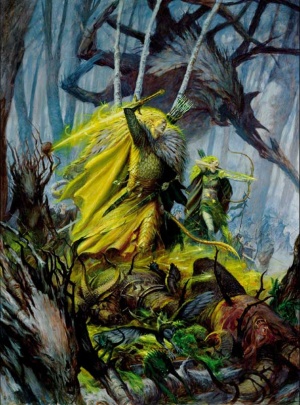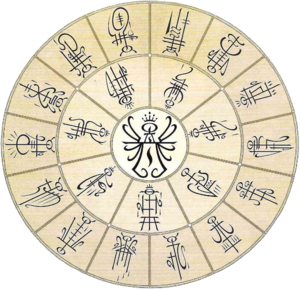40K LORE: The Eldar War In Heaven


In ancient days before mankind, the Eldar gods bestowed both great gifts and unspeakable pain upon their children.
The Beginning of the Eldar
The Eldar race are descended from Isha, the goddess of the harvest, and Kurnous, the god of the hunt, through the two brothers Eldanesh and Ulthanesh. Their first leader was Eldanesh, who, with the support of his brother Ulthanesh, led the Eldar to many victories over nightmarish foes such as the Hresh-selain.
In their moment of creation, the Eldar were given one gift by each God: Asuryan gave the Eldar wisdom, so that they may know themselves; Isha gave the Eldar love, so that they may know one another; Vaul gave the Eldar the Artifice, as a means to make their dreams realities; Lileath gave the Eldar joy, so that they would be happy; Kurnous have the Eldar desire, so they that would prosper; Morai-Heg gave the Eldar foresight, so that they would know their place in the world; Khaine gave the Eldar anger, so that they may have a means to defend their gifts.
In the early days, there was no barrier between gods and mortals – the deities walked among the Eldar, teaching them and leading them in an age of peace and prosperity.
Isha’s Tears
Yet one day, Lileath the maiden goddess dreamed that the Eldar would cause the destruction of Khaine, god of war. As Lileath was well-known for her prophetic dreams, Khaine took it very seriously and resolved to wipe out the Eldar race rather than let them destroy him. The ensuing slaughter was of such proportions that Isha, goddess of the earth, petitioned Asuryan to stop it. Asuryan did so, and created a barrier between the Eldar and their gods, forever separating the two, and decreed that no god was to intervene or communicate with the Eldar ever again. So, Khaine’s war on the Eldar was stopped, for a time.
This was too much for Isha, and her consort Kurnous, god of the hunt. Isha and Kurnous loved their children, the Eldar, and could not bear to separated from them. They approached Vaul, the smith god, with their woes, and the kindly Vaul agreed to help them. With Vaul’s aid, they forged spirit stones through which mortal Eldar could communicate with the gods. With these stones, Isha and Kurnous continued to teach and mentor their mortal children in secrecy.
Peace was not to last, though, as one day Khaine stumbled upon the two as they communicated with the Eldar, and took the information straight to Asuryan. Though Asuryan was sympathetic with Isha and Kurnous, they had broken his own laws and he reluctantly decreed that the two gods be given to Khaine, to do with as he wished.
The War in Heaven
Khaine tortured Isha and Kurnous, utilizing every cruel art he knew. Many of the gods secretly thought Khaine was going too far and supported Isha and Kurnous, but only one was willing to stand up for them in public. Vaul petitioned for their release, and eventually he and Khaine came to an agreement. In one year’s time, Khaine would release Isha and Kurnous in exchange for one hundred swords. Vaul was such a master smith that a single blade of his was of incalculable value – indeed, a single mortal with a Sword of Vaul could stand against a thousand with mundane weapons.
Vaul immediately set to work, rejoicing. Unfortunately, when the year was up, he had only completed ninety-nine swords, rendering the bargain void. He took an ordinary mortal blade and mixed it in with the others, hoping that Khaine would not notice. Upon delivery, Khaine was so pleased with the weapons that he released Isha and Kurnous forthwith, delighting in the craftsmanship that had gone into the swords. It was only when Isha and Kurnous were long gone that Khaine discovered the one mortal sword.
Khaine roared in anger, calling Vaul a cheat, a liar, and a thief. He immediately set off to track Vaul down and make him pay. The wars that followed polarized the gods, Khaine’s faction and Vaul’s faction engaging in bloody warfare for an eternity. Gods changed sides, great deeds of heroism and of craven evil were performed on both sides, and the war was mirrored in a struggle between the Eldar in the mortal realms. Asuryan himself never took a side, watching the carnage impassively, slowly coming to regret his impetuosity in sentencing Isha and Kurnous. (This is not the only “story” telling of the hundred swords, another consists of the Eldar and Khaine going to war with the Necrons and failing because of the one “mortal” sword.)
Anaris
Vaul reforged the final sword, the one that he had failed to finish for Khaine, the greatest of all, and called it Anaris. Armed with this weapon, Vaul strode forth to do battle with Khaine. It was a long, hard-fought struggle, but even with Anaris, Vaul was no match for the war god. Khaine cast down Vaul, maiming the smith, and bound Vaul to his own anvil.
However, the falcon, Faolchú, consort of the Great Hawk, who had fought for Vaul, took the sword Anaris and delivered it straight to Eldanesh, greatest of the mortal Eldar. With Anaris in hand, Eldanesh of the Red Moon took up the fight and faced Khaine in single combat. Eldanesh fought well, but in the end he too was defeated by Khaine, his body crushed by the god of war. As Khaine slew Eldanesh his hands began to drip with red blood. Forever after he was to become known as Khaela Mensha Khaine, which means “Khaine the Bloody-Handed”. Asuryan had seen enough of the slaughter and proclaimed the war over. Khaine had had his vengeance and left the field satisfied.
In time Isha’s vision would came to pass and the Eldar’s folly would lead to the dismemberment of Khaine.
Learn More of Eldar Mythology
Lexicanum






